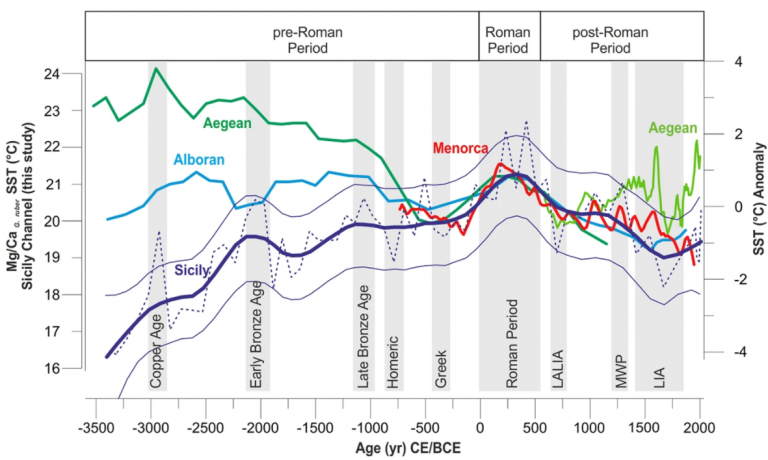Warmth led to the rise of the Roman Empire, while cooling accompanied its demise
A new paper appearing in Scientific Reports titled “Persistent warm Mediterranean surface waters during the Roman period” by Margaritelli et al looks at the climate at the time of the rise and fall of the Roman Empire, and beyond.
Hat-tip: Die kalte Sonne
5000-year reconstruction
The team of scientists reconstructed sea surface temperatures (SST) By analyzing a sediment core taken from the Sicily Channel. This new temperature record was also compared to a North Hemisphere temperature reconstruction, and others from the Mediterranean. The team of researchers found a “persistent regional occurrence of a distinct warm phase during the Roman Period” over a very broad part of the northern hemisphere.
2°C warmer than average
The authors say these reconstructions (Fig. 3 below) “consistently show the Roman as the warmest period of the last 2,000 years” and “2°C warmer than average values for the late centuries for the Sicily and Western Mediterranean regions”.
Comparison of the SSTs records from Sicily Channel (thick dark blue line, to others across the Mediterranean. Source: here.
The authors hypothesize there was a “potential link between this Roman Climatic Optimum and the expansion and subsequent decline of the Roman Empire”.
Warm = prosperity, not Climageddon
The authors note the pronounced warming during the Roman Period is also “almost consistent with other marine records from Atlantic Ocean56,57,58 as well as the continental anomaly reconstruction from Europe from PAGES 2 K, 201359.”
The Roman Climatic Optimum was characterized by prosperity and expansion of the empire, all during a period of warmth that is comparable to today.
“Greatest ancient civilization of all time”
The team of scientists concluded that the very warm conditions were particularly intense and correspond to the so called “Roman Climatic Optimum”. “It was during this period that the greatest ancient civilization of all time, the Roman one, developed.”
“We hypothesize the relevance that these climate conditions may had in the expansion of the Roman Empire and its collapse with the general development of colder conditions,” the authors further conclude. “A cooling trend dominated after the Roman period reaching minimum values, in the whole Mediterranean, by the end of the LIA…”
“The post-Roman Period was characterized by a progressive cooling trend of 4.5 °C ± 2.1 °C that ended by the Little Ice Age (LIA) interval (Fig. 2) and was punctuated by two short-term events well-known as the Late Antique Little Ice Age (LALIA) and the Medieval Warm Period (MWP).”






Humans are tall and thin (when not overfed), have no fur and sweat all over. They are clearly not cold weather animals but very well adapted to heat.
Nice observation, S.K.
I notice the Aegean cooling while the Sicilian warms. I wonder if this has anything to do with power shifting from the eastern Mediterranean to the central Mediterranean.
So warmth produced Brutus, Caligula, Nero, Caracalla, Tiberius, and last but not least Constantine?
The British Empire commissioned a study , The Rise ad Fall of the Roman Empire by Gibbon, to avoid the collapse of their Rome.
The current global empire, in their minds the greatest of all of history, is about to collapse under $15 Quadrillion debt, and they want to make the plebs pay, very much like their model forerunner. This time, rather like Diocletian, the useless masses should rent everything and own nothing – Davos’ proclamation of the modern Roman pantheon.
Want to do a great Leap Backward to the Green New Deal, Prince Charles’ Great Reset, anyyone?
I’d take Gibbon with a large rucksack of salt. Having slogged through it as an undergrad, it seemed to me that it was as much self-propaganda as to why the British Empire could not possibly succumb to the same things that caused the “collapse” (sic) of the Roman Empire.
Gibbon basically ran with the idea that the Roman Empire collapsed due to a huge barbarian onslaught – chiefly to then claim that a) it was geographically-impossible for this to happen to Britain, due to all the intervening civilized countries on the map, and b) in order to challenge Britain, the barbarians would have to become civilized enough to develop modern weapons, and thus would then be too civilized to attack Britain.
(This thesis was then applied whole-cloth to explain the Bronze Age collapse – until so much archaeological evidence accumulated to show that this couldn’t be what happened.)
The “collapse” of the western Roman empire is of course a MUCH more complicated matter – as it didn’t really “collapse” but instead was subsumed by-and-with newcomers. And the Roman Empire in fact persisted with continuity for another millennium – as the capitol city had been shifted to Constantinople in the 4th century.
Those Romans liked to get their business done before it got too hot.
There is much anecdotal evidence that people enjoyed living in warmer centuries, and hated living in cooler centuries.
But what could they possibly know?
Just being alive in a past century is not good enough.
They were not science PhDs, with pal-reviewed papers, published in prestigious science journals.
They did not have computer climate models.
Most important, they did not have the brilliant, especially in his own mind, perfessr Michael Mann, to tell them the climate never changed in their centuries — climate change is new, starting in the 20th century.
And they did not have the Mann hockey stick chart to inform them.
So those old timers, in prior centuries, must have imagined enjoying warmer climates, and they also imagined hating cooler climates.
This comment is serious. not satire.